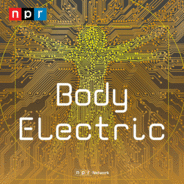Last fall, over 20,000 listeners joined our study with Columbia University to take movement breaks throughout the day. They reported that the more breaks they took, the better they felt. So what's the secret to sticking with it? In this episode, host Manoush Zomorodi shares the top 10 listener tips to start moving, and keep moving, in 2024. Click here to join the Body Electric challenge: npr.org/bodyelectricLearn more about sponsor message choices: podcastchoices.com/adchoicesNPR Privacy Policy

Gesundheit, Wellness & Beauty
Body Electric Folgen
Our bodies are adapting and changing to meet the demands of the Information Age. What is happening? And what can we do about it? This six-part series is an interactive investigation into the relationship between our technology and our bodies...and how we can fix it.
Folgen von Body Electric
24 Folgen
-
Folge vom 08.01.2024Top 10 Listener Tips To Keep Moving
-
Folge vom 17.11.2023Part 6: Walk Into The FutureIn part six: host Manoush Zomorodi digs into the preliminary results of the listener study with Columbia University researcher Keith Diaz. He shares the surprising — and encouraging — initial findings from more than 20,000 listeners who tried to incorporate movement breaks into their day.Also on this episode, listener Dana Lopez Maile describes how the study was a "game changer" for her health. Yiliu Shen-Burke, founder of the augmented reality app SoftSpace, explains his vision of augmented reality. Finally, Manoush explores the future of screen time in a new era of artificial intelligence, and the inextricable convergence of humans and machines.Click here to find out more about the project: npr.org/bodyelectricLearn more about sponsor message choices: podcastchoices.com/adchoicesNPR Privacy Policy
-
Folge vom 17.11.2023Part 5: The Mind-Body-Tech ConnectionIn part five: host Manoush Zomorodi investigates what information overload does to our physical and mental health. Could our tech use be interfering with the critical dialogue that takes place between the body and the brain? Psychiatrist and neuroscientist Sahib Khalsa shares his latest research on interoception — the brain's ability to sense how the body is feeling — and how finding time to unplug from our devices can help us tune into our body's natural signals.Also in this episode: neurologist Caroline Olvera takes us inside the "TikTok tics" outbreak — exploring why thousands of teens developed Tourette's-like symptoms after watching TikTok videos in 2021. Plus, how a school in Washington, DC helps kids stay connected to their bodies by creating a high-movement, low-tech environment.Click here to find out more about the project: npr.org/bodyelectricWe'd love to hear from you. Send us a voice memo at bodyelectric@npr.org. Talk to us on Instagram @ManoushZ.Learn more about sponsor message choices: podcastchoices.com/adchoicesNPR Privacy Policy
-
Folge vom 17.11.2023Part 4: Below the BeltIn part four: host Manoush Zomorodi explores the connection between our posture and our mood. A lot of us associate our neck and back pain with spending hours hunched over our phones and laptops. But what if that hunched posture is also making us feel tired, stressed, and anxious? Neuroscientist Peter Strick discusses his groundbreaking research on why exercising our core muscles lowers our stress.Also in this episode: how a faulty, incorrect study went viral — claiming smartphones were causing people to grow horns on their backs. Science journalist Nsikan Akpan sets the record straight. Later, writer Paul Ingraham shares his daily strategy for doing movement snacks and strength building while balancing deadlines.Click here to find out more about the project: npr.org/bodyelectricWe'd love to hear from you. Send us a voice memo at bodyelectric@npr.org. Talk to us on Instagram @ManoushZ.Learn more about sponsor message choices: podcastchoices.com/adchoicesNPR Privacy Policy
